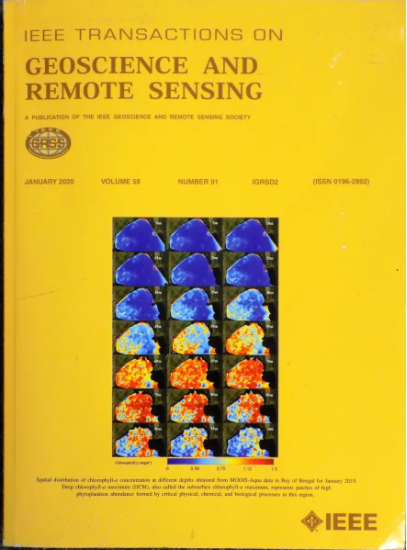Statistical Analysis of Reflected GNSS Signal Off Sea Surfaces From a Coastal Scenario
IF 7.5
1区 地球科学
Q1 ENGINEERING, ELECTRICAL & ELECTRONIC
IEEE Transactions on Geoscience and Remote Sensing
Pub Date : 2024-11-18
DOI:10.1109/TGRS.2024.3500014
引用次数: 0
Abstract
This article presents the statistical analysis of the reflected global navigation satellite system-reflectometry (GNSS-R) signal from a coastal experiment, including the non-Gaussianity, probability distribution functions, autocorrelations, and fractal dimensions of the speckle and texture components. The results clearly show that the amplitude distribution is modeled well by a Weibull model. The texture component of the reflected GNSS signal has a log-normal distribution. Due to the presence of the coherent and non-coherent components, the phase of the reflected signal is not uniformly distributed with沿海场景海面反射 GNSS 信号的统计分析
本文介绍了对海岸实验中反射的全球导航卫星系统-反射测量(GNSS-R)信号的统计分析,包括斑点和纹理成分的非高斯性、概率分布函数、自相关性和分形维度。结果清楚地表明,振幅分布可以用 Weibull 模型很好地建模。反射的 GNSS 信号的纹理成分具有对数正态分布。由于相干分量和非相干分量的存在,反射信号的相位分布并不均匀,为 $/left [{{-\pi, \pi }}\right]$ 。斑点分量和纹理分量的自相关函数(ACF)都是高斯型的,相关时间分别为几百毫秒和几秒。反射的 GNSS 信号的某些统计特性取决于 GNSS-R 的几何形状和海况;因此,一旦校正了 GNSS-R 几何形状的影响,就可以利用它们来确定海况。例如,反射的 GNSS 信号的斑点和纹理相关时间可用于检索风速。斑点和纹理相关时间提供的检索风速均方根误差(RMSE)分别为 1.66 和 1.75 米/秒。当使用最小方差估计器融合两个检索到的风速时,均方根误差降低到 1.46 m/s。这项工作有助于建立海面全球导航卫星系统信号散射模型,以及进一步研究海岸全球导航卫星系统-R,以监测海况和海上目标。
本文章由计算机程序翻译,如有差异,请以英文原文为准。
求助全文
约1分钟内获得全文
求助全文
来源期刊

IEEE Transactions on Geoscience and Remote Sensing
工程技术-地球化学与地球物理
CiteScore
11.50
自引率
28.00%
发文量
1912
审稿时长
4.0 months
期刊介绍:
IEEE Transactions on Geoscience and Remote Sensing (TGRS) is a monthly publication that focuses on the theory, concepts, and techniques of science and engineering as applied to sensing the land, oceans, atmosphere, and space; and the processing, interpretation, and dissemination of this information.
 求助内容:
求助内容: 应助结果提醒方式:
应助结果提醒方式:


